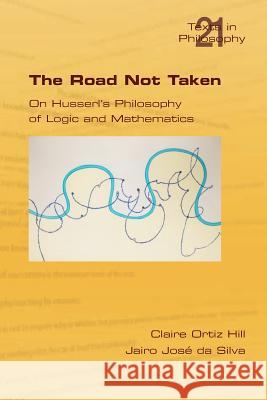The Road Not Taken. on Husserl's Philosophy of Logic and Mathematics » książka
The Road Not Taken. on Husserl's Philosophy of Logic and Mathematics
ISBN-13: 9781848900998 / Angielski / Miękka / 2013 / 454 str.
The Road Not Taken. on Husserl's Philosophy of Logic and Mathematics
ISBN-13: 9781848900998 / Angielski / Miękka / 2013 / 454 str.
(netto: 110,68 VAT: 5%)
Najniższa cena z 30 dni: 115,57
ok. 16-18 dni roboczych
Bez gwarancji dostawy przed świętami
Darmowa dostawa!
For different reasons, Husserl's original, thought-provoking ideas on the philosophy of logic and mathematics have been ignored, misunderstood, even despised, by analytic philosophers and phenomenologists alike, who have been content to barricade themselves behind walls of ideological prejudices. Yet, for several decades, Husserl was almost continuously in close professional and personal contact with those who created, reshaped and revolutionized 20th century philosophy of mathematics, logic, science and language in both the analytic and phenomenological schools, people whom those other makers of 20th century philosophy, Russell, Frege, Wittgenstein and their followers, rarely, if ever, met. Independently of them, Husserl offered alternatives to the well-trodden paths of logicism, nominalism, formalism and intuitionism. He presented a well-articulated, thoroughly argued case for logic as an objective science, but was not philosophically naive to the point of not seeing the role of subjectivity in shaping the sense of the reality facing objective science. Given the preeminent role that philosophy of logic and philosophy of mathematics have played in transforming the way philosophy has been done since Husserl's time, and given the depth of his insights and his obvious expertise in those fields, his ideas need to be integrated into present-day, mainstream philosophy. Here, philosopher Claire Ortiz Hill and mathematician-philosopher Jairo da Silva offer a wealth of interesting insights intended to subvert the many mistaken idees recues about the development of Husserl's thought and reestablish broken ties between it and philosophy now."
For different reasons, Husserls original, thought-provoking ideas on the philosophy of logic and mathematics have been ignored, misunderstood, even despised, by analytic philosophers and phenomenologists alike, who have been content to barricade themselves behind walls of ideological prejudices.Yet, for several decades, Husserl was almost continuously in close professional and personal contact with those who created, reshaped and revolutionized 20th century philosophy of mathematics, logic, science and language in both the analytic and phenomenological schools, people whom those other makers of 20th century philosophy, Russell, Frege, Wittgenstein and their followers, rarely, if ever, met. Independently of them, Husserl offered alternatives to the well-trodden paths of logicism, nominalism, formalism and intuitionism. He presented a well-articulated, thoroughly argued case for logic as an objective science, but was not philosophically naive to the point of not seeing the role of subjectivity in shaping the sense of the reality facing objective science.Given the preeminent role that philosophy of logic and philosophy of mathematics have played in transforming the way philosophy has been done since Husserls time, and given the depth of his insights and his obvious expertise in those fields, his ideas need to be integrated into present-day, mainstream philosophy. Here, philosopher Claire Ortiz Hill and mathematician-philosopher Jairo da Silva offer a wealth of interesting insights intended to subvert the many mistaken idées reçues about the development of Husserls thought and reestablish broken ties between it and philosophy now.











